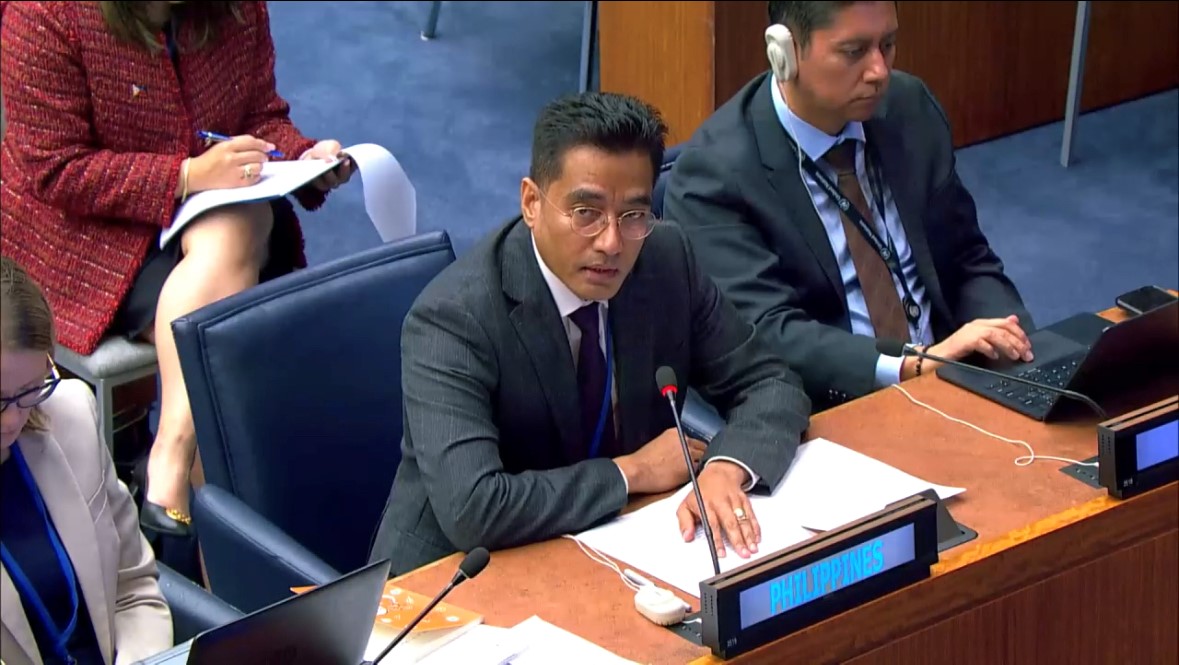
In the 78th session of the United Nations First Committee, the Philippines played a vital role as a bridge builder. Advocating a middle-of-the-road approach, the country encouraged a balanced dialogue, emphasizing critical areas of international security and disarmament.
The Philippines, which actively participates in disarmament, non-proliferation and arms control processes, addressed the multiple challenges posed by autonomous weapons systems. These challenges encompass humanitarian, legal, security, technological and ethical dimensions, central to the global security discourse.
Ambassador Ariel R. Peñaranda, Acting Chargé d’Affaires of the Philippines to the United Nations in New York, said: “As technology advances, we must ensure that our global governance regime remains adaptable. For this reason, we ask for legal regulations that prevent the weaponization of artificial intelligence and we advocate for the responsible use of emerging technologies.
The adoption of a resolution, which garnered the overwhelming support of 168 Member States, underscores the Philippines’ commitment to addressing the complex issues raised by lethal autonomous weapons and upholding international law. This resolution revitalizes multilateral efforts toward these goals.
During the session, the First Committee approved 60 draft resolutions and one decision, and the Philippines co-sponsored 25 of them. These resolutions ranged from advocating for a world free of nuclear weapons to preventing the acquisition of weapons of mass destruction by terrorists. Global norms on deadly weapons, such as cluster munitions, and the intersection of disarmament with development and the environment were also addressed, emphasizing multilateralism in disarmament and the critical role of youth in these debates.
Amid rising global tensions and proliferation of resolutions, especially in the fields of outer space and cybersecurity, the Philippines urged Member States to avoid further discord. The First Committee must serve as a platform for collective action to promptly address issues of disarmament and peace and security.
Philippines presents report on legal framework for the Protection of People in Events of Disasters as chair of UN working group
The Philippines reiterated its commitment to a middle-ground approach that garners broad support from delegations. While outer space and cyberspace present evolving challenges, the enduring issues of nuclear weapons, other weapons of mass destruction, and conventional weapons require continued attention.
The Philippines has called on nuclear-weapon States to assume their disarmament obligations and implement a moratorium on the production of fissile material pending the start of negotiations in the Conference on Disarmament (CD). It also called for maintaining a moratorium on nuclear weapons test explosions and any other nuclear explosions, and for the remaining Annex 2 States to ratify the Comprehensive Nuclear-Test-Ban Treaty, among other measures.
As an emerging space nation, the Philippines stressed that outer space security is not only about strategic parity among major space nations, but also about the preservation of outer space for peaceful uses by all nations and future generations.
To improve the effectiveness of the disarmament machinery, the Philippines led a coalition of 28 States that asked the CD to grant observer status to all interested UN Member States without obstruction, recognizing the vital role that all States play in the maintenance and strengthening of international security. This call came after 39 States, including the Philippines, were completely prevented from participating in this year’s CD session.
The adoption of a resolution underscores the Philippines’ commitment to addressing the complex issues raised by lethal autonomous weapons and upholding international law.
To improve the effectiveness of the disarmament machinery, the Philippines led a coalition of 28 States, calling on the CD to grant observer status to all interested UN Member States, without obstruction. This recognizes the vital role that all States play in maintaining and strengthening international security. This call came after 39 States, including the Philippines, were prevented from participating in this year’s CD session.
In his closing speech, Ambassador Rytis Paulauskas of Lithuania, Chairman of the First Committee, stated that agreements and treaties are an important foundation “on which our security is built”, and that no effort should be spared to preserve them, as well as other foundations of disarmament, non-proliferation and arms control.
The First Committee is mandated to debate disarmament, global challenges and threats to peace affecting the international community, and to seek solutions to challenges to the international security regime. In this regard, the Philippines, as a bridge builder, remains steadfast in its mission to contribute to the search for solutions and the promotion of a balanced and middle-ground approach in the international security landscape.
Source: https://reporteasia.com/destacado/2023/11/15/filipinas-superar-diferencias-seguridad-internacional-desarme

